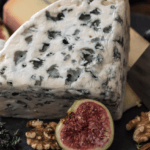 For those of us who have lived in France, walking along the cheese aisles in any other country is often proven to be a more or less disappointing experience. I left Paris during COVID and scrambled my way back to my home country Canada. The cheese options at grocery stores back home are…umm…“limited” (not to mention the disruption to the supply chain from COVID-19). Even on a good day, France can single-handedly take down anyone else in the cheese production industry. So why does France have such a delicious array of cheeses? I would put down my baguette slices, take a judgmental sip of Burgundy and whisper in your ear: rich and abundant and “terroir”.
For those of us who have lived in France, walking along the cheese aisles in any other country is often proven to be a more or less disappointing experience. I left Paris during COVID and scrambled my way back to my home country Canada. The cheese options at grocery stores back home are…umm…“limited” (not to mention the disruption to the supply chain from COVID-19). Even on a good day, France can single-handedly take down anyone else in the cheese production industry. So why does France have such a delicious array of cheeses? I would put down my baguette slices, take a judgmental sip of Burgundy and whisper in your ear: rich and abundant and “terroir”.
And no, it has nothing to do with the “Reign of Terror,” a dark and violent period of time during the French Revolution when people lost their heads every day. Terroir is the concept that ensures the products you buy at the markets come from their supposed places of origin.
The word means earth or land, but the English translation does not do it justice because it is not simply a word but a notion belonging to the French. Thomas Parker wrote in his book Tasting French Terroir: The History of an Idea that the idea dates as far back as to the Middle Ages when people would joke about “you are what you eat,” believing in the link between people’s personalities and the food they consume. The concept was first applied to wines when French winemakers observed the differences of the taste and smell between wines produced in various regions. Over the centuries, many realized that the region’s climate, the topography of the vineyards, nutrients from the soil, and the surrounding plants are integral to the quality and taste of the wines. France is a country consisting of vastly different weather, from the mild and oceanic Brittany to the warm and sunny Mediterranean coast, and both geography and climate influence the specialties of individual regions. Terroir determines what products are best suited to the local weather and enforces the originality of these products.

Terroir in wine production becomes especially evident when one compares it to other countries’ standards. For example, in New World wine countries—namely the United States, Australia and New Zealand—winemakers often name their wines after the grape varietals instead of regions. They also sometimes name their bottles after wines that resemble those from Europe, while the French, on the other hand, name their wines after the region where they are produced, protecting the wine’s identity and uniqueness and marking the region as a selling point. The most plainly obvious example is Champagne. Champagne is a sparkling wine, but not any sparkling wine can be called champagne. Only the sparkling wine produced in the Champagne region deserves the privilege of being named so. In the age of global trading and industrialized food, the French still draw significant emphasis on the originality and particularity of their products.

“I tell clients on the tours that if they want to put a French person into an apoplectic fit, they can call any old sparkling wine Champagne, or any old blue cheese, Roquefort.” — said Flavors of Paris guide and founder Lisa Rankin
Terroir eventually permeated into other products. Take Roquefort cheese, for example. This cheese can’t be named Roquefort cheese unless it follows seven appellation d’origine contrôlée, or AOC, regulations. AOC is the French certification given to products to indicate that they are produced at their place of origin with the original techniques. So if you produce your cheese with either a different method or in a different region, you aren’t permitted to call your cheese Roquefort (I can sense the chill of intellectual property lawyers staring from behind).
With Terroir high praises comes its most skeptical critics. According to Food & Wine, the earliest critics were none other than France’s elites in the era of ancien régime, who rejected the entire concept of terroir and believed that eating local was only for “peasants.” In the modern world, some doubt the influence of soil on the taste of the wines, while others deny the entire existence of terroir, calling it a “myth.”
Perhaps what matters about terroir is not so much about its practical implementation but the dedication and hard-work French winemakers and farmers put into their work. They take pride in their products and are not afraid to shy away from it. Steven Erlanger sums up the concept in his article, written for The New York Times, that Terroir “is not about proximity, but about honesty and community, an idea even more important to a France that fears losing its identity in a larger Europe and a competitive world.
Comment (0)